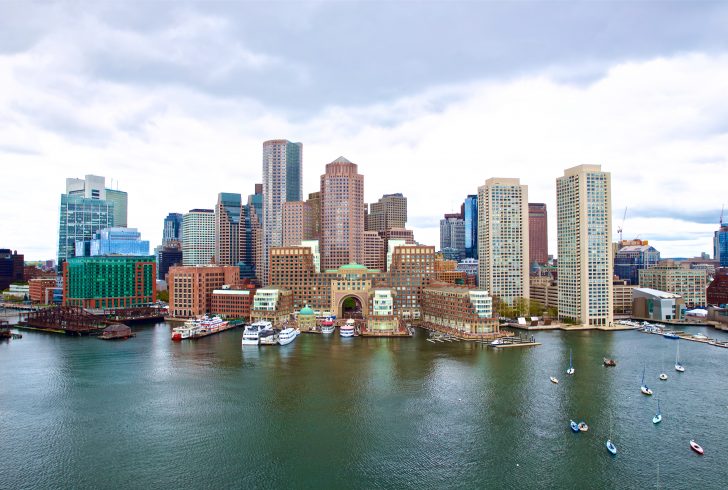Stone Living Lab Awards Three Research Grants to Study Social and Economic Impacts of Climate Change


The Stone Living Laboratory, a partnership of the University of Massachusetts Boston, National Park Service, Massachusetts Executive Office of Energy and Environmental Affairs (EOEEA), Massachusetts Department of Conservation and Recreation (DCR), the City of Boston, and Boston Harbor Now, has announced the award of three research grants to study the social and economic impacts of “nature-based” approaches to coastal flood protection.
Salem State University, UMass Dartmouth, and A Better City each received grant awards to examine the connections between nature-based approaches and topics such as public health and wellness, access to open space and economic opportunity, and climate justice.
An alternative to “gray” anti-flooding infrastructure like concrete walls or barriers, nature-based approaches protect coastal communities by mimicking natural environments and contributing to ecosystems. Along with their environmental benefits, nature-based approaches have the potential to contribute to more equitable, healthy, and socially-connected coastal communities – but more research is needed to identify best practices and harms to avoid.
“We are excited to be working in partnership with these three outstanding organizations to help further The Stone Living Lab’s research and knowledge of nature-based approaches,” said Paul Kirshen, Director of Research for the Lab. “Each brings a unique set of skills, knowledge, and commitment to their communities that will augment our efforts to engineer and apply nature-based approaches to address sea-level rise.”
“Nature-based approaches and their potential co-benefits are exciting, alternative ways of protecting urban coastal populations from the threats of coastal flooding. However, we need to understand how these projects can be implemented in ways that directly benefit historically marginalized and socially vulnerable groups, and don’t inadvertently add to, or create new problems for already overburdened communities,” said Marcos Luna, Professor of Geography and Sustainability, and Principal Investigator at Salem State University. “We need these projects to be informed by knowledge, tools, and policies that are sustainable and also socially equitable.”
“A Better City’s award from the Stone Living Lab to examine nature-based protections for East Boston’s Blue Line is a forward-thinking approach that will have spill-over effects in our vulnerable peninsular community,” said Phil Giffee, Executive Director of the Neighborhood of Affordable Housing, an East Boston advocacy group. “Being adjacent to the diminishing and threatened Belle Isle Marsh, the neighborhood would much prefer protective green resiliency measures around our waterline and neighborhood assets to gray concrete walls stacked lego-like around the community.”
“To have nature-based solutions be considered as a serious part of our portfolio of shoreline flood risk reduction will require it to be measured in the same way as traditional approaches. That means having robust science to quantify protection as well as other co-benefits like recreation that are important to coastal communities. This funding will help us build the evidence base for quantifying recreational benefits of different flood risk reduction approaches as well as move us towards a scalable tool that can be used in any project evaluation,” said Robert Griffin, Principal Investigator at UMass Dartmouth.
The awards were granted to:
This project will generate new knowledge and understanding to promote climate justice when implementing nature-based approaches for coastal flood risk in the Northeast. The goal is to identify recommendations for key policy and regulatory measures to better ensure that the benefits and co-benefits of nature-based systems can accrue to socially vulnerable populations in close proximity to planned or installed nature-based resilience investments.
This project aims to investigate the potential to deploy nature-based approaches along the MBTA’s Blue Line corridor in East Boston (an environmental justice community) to protect critical transportation infrastructure from coastal flooding, to support ecosystem restoration, and to improve the health and vibrancy of marginalized communities and commercial districts.
This project will examine whether social media and cell phone data can be used to understand the demographics of visitors to the shoreline. This research will help inform whether or not these types of data can be used to assess social impacts (for example, changes in demographics of visitors to a particular site following a nature-based intervention).
The one-year-long research projects are expected to get underway in summer 2022.
About the Stone Living Lab
Launched in 2020, the Stone Living Laboratory is an innovative coastal resiliency laboratory within the Boston Harbor Islands National and State Park with funding from the James M. and Cathleen D. Stone Foundation to engage researchers, students, and the public in testing innovative, adaptive, nature-based approaches centered around four core priorities: research, climate preparedness, education, and policy in Boston, the Harbor Islands, and other coastal locations. More information about the Lab can be found at their website www.stonelivinglab.org.